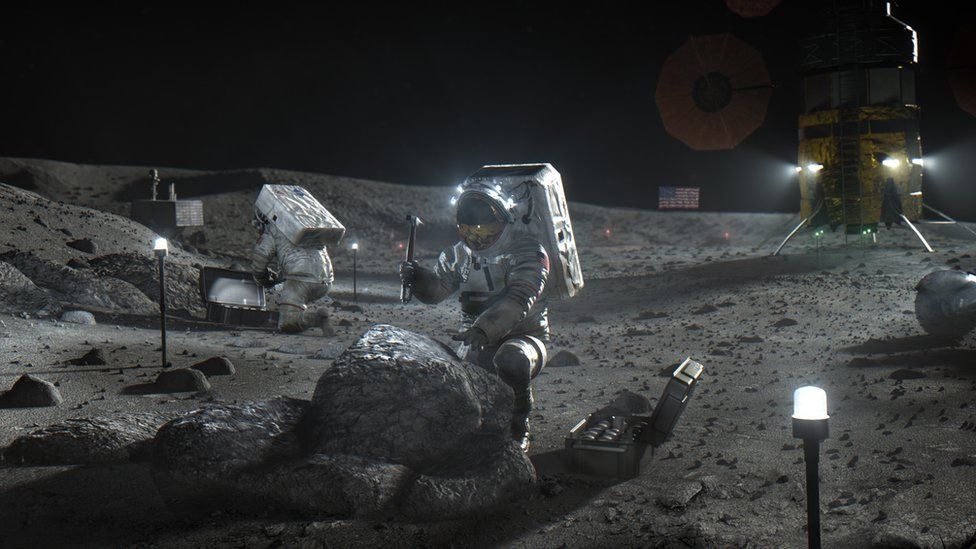Initially, I started this series because of the 2021 World Science Fiction Convention, DisCON which I WOULD have been attending in person if I felt safe enough to do so in person AND it hadn’t been changed to the week before the Christmas Holidays…HOWEVER, as time passed, I knew that this was a subject I was going to explore because it interests me…
In a recent video https://www.youtube.com/watch?v=JvCSZHfjmZ4, NASA ASU Professor and Asteroid Scientist, Lindy Elkins-Tanton, gives a pretty firm and unambiguous answer: “No NASA is not mining asteroids…” BUT… “What NASA is doing is fundamental science, research missions that go out to the asteroids and try and understand more about them and they will help any eventual future efforts to mine the asteroids. We ARE going to go visit an asteroid we think is made largely of metal.”
So, the answer Dr. Elkins-Tanton gives is clear and unambiguous.
“Or,” (as my granddaughter and grandson are fond of saying), “IS it???”
The NASA mission to Psyche, the metal asteroid they’re targeting, is set to launch on October 10, 2023 for the Psyche orbiter to launch and get to the asteroid by August 2029. But is that realistic? Anyone reading this KNOWS how NASA sets it sights, budgets bloom, Congress gets antsy with repeated requests for “more funding” and eventually a good idea gets buried – especially since we no longer have anyone breathing down our neck.
“Or,” (as my granddaughter and grandson are fond of saying), “do we???”
China’s efforts at asteroid mining, while typically wrapped in layers of secrecy about specific facts and technology, this article from SKN News in September of 2020: (St. Kitts and Nevis, east of the island of Hispaniola (Haiti and the Dominican Republic) ran nothing but this headline: “China to send first-ever ‘asteroid mining robot’ into space this November” (https://sknnews.com/world-news/china-to-send-first-ever-asteroid-mining-robot-into-space-this-november-42276979/)
That’s it. Nothing else. No story, no nothing.
But digging around deeper, I found this: “The SuperView Neo 1-01 & 02 satellites were designed and manufactured by the China Association for Science and Technology (CAST) for China Siwei Survey and Mapping Technology Co. Ltd. (China Siwei), a leading company providing geospatial information services in China…Neo constellation will include at least 28 satellites of 3 series. The first one is called SuperView Neo-1 and it aims to provide 20 to 30 cm optical images. SuperView Neo-2 will produce synthetic-aperture radar (SAR) images with 50 cm resolution in spotlight mode, whereas SuperView Neo-3 will acquire large swath-width optical images with resolution higher than 1 meter. On this mission, two satellites of the first series (SuperView Neo-1) were launched. These satellites have a mass of 540 kg each, with resolution down to 0.3 meters.” (https://everydayastronaut.com/superview-neo-1-01-02-long-march-2c/)
In an article dated September 2020, India News (https://www.mining-technology.com/news/origin-space-launch-mining-robot-space/) reported: “As part of this mission, Origin Space will use a small satellite called NEO-1, weighing nearly 30kg…NEO-1 will be launched as a secondary payload by a China-made Long March series rocket. The launch of NEO-1 will mark the ‘first steps’ taken towards testing capabilities as part of efforts to detect and extract space resources. India Today quoted Origin Space co-founder Yu Tianhong as stating: ‘The goal is to verify and demonstrate multiple functions such as spacecraft orbital manoeuvre, simulated small celestial body capture, intelligent spacecraft identification and control.’ The long-term objective of the space company is to develop rare-earth metals and mineral resources from near-Earth asteroids.”
So…China launched NEO-1 and NEO-2: “The NEO-01, developed by Nanjing-based Origin Space Technology Co, which claims to be the first Chinese company dedicated to exploring and utilizing space resources, was launched on a Long March 6 rocket for space debris removal and asteroids mining experiments in deep space in April 2021…the robot prototype completed an experiment of using a large net to capture space debris and the relative technique verification in key steps, which is the first commercial company in the world to complete such an experiment.” (https://www.globaltimes.cn/page/202211/1279404.shtml)
So the race has begun – not between the defunct Soviet Union; nor the ineffective regime currently in the Kremlin, mired down in a war that was supposed to last weeks, but has stretched into eighteen months of slogging push and shove with absolutely nothing to show for it as it rapidly descends into a punchline for a joke...
First soldier: “Russia is second most powerful military nation…”
Second soldier: “Da, in Ukraine.”
but between the US and China; and right now, it seems that China might have more enthusiasm than we do… “Or,” (as my granddaughter and grandson are fond of saying), “do they???”
New Source: https://www.youtube.com/watch?v=JvCSZHfjmZ4
Fundamental Resource: (A general Wikipedia post detailing what the authors currently know about asteroid mining: https://en.wikipedia.org/wiki/Asteroid_mining)
Noted Resources: https://en.wikipedia.org/wiki/List_of_asteroid_close_approaches_to_Earth, https://www.pharostribune.com/news/local_news/article_7fcd3ea5-3c14-533f-a8d5-9bf629922f34.html, https://www.fool.com/investing/2022/04/29/like-asteroid-mining-be-careful-what-you-wish-for/, https://www.nps.gov/wrbr/learn/historyculture/theroadtothefirstflight.htm, https://hackaday.com/2019/03/27/extraterrestrial-excavation-digging-holes-on-other-worlds/, https://www.planetary.org/space-missions/every-small-worlds-mission
Image: https://ichef.bbci.co.uk/news/976/cpsprodpb/A2D5/production/_114558614_hls-eva-apr2020.jpg


No comments:
Post a Comment